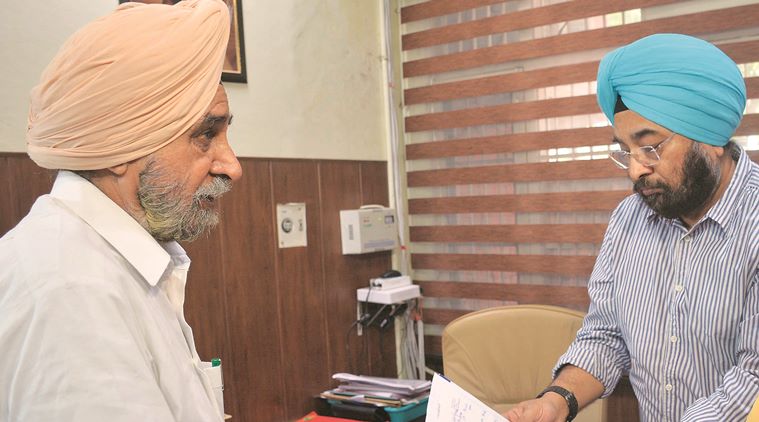 Punjab’s Rural and Urban Development Minister Tripat Rajinder Singh Bajwa landed at the civil hospital in Mohali Thursday for a dope test, but was not screened as he was on medication for headache. Bajwa said he would come again on Monday after skipping his pills. (Express photo by Jasbir Malhi)
Punjab’s Rural and Urban Development Minister Tripat Rajinder Singh Bajwa landed at the civil hospital in Mohali Thursday for a dope test, but was not screened as he was on medication for headache. Bajwa said he would come again on Monday after skipping his pills. (Express photo by Jasbir Malhi)
A day after the Punjab government announced to conduct a dope test on its employees, there was no clarity about details and modalities of the test.
Even as Punjab Government Employees Organisation (PGEO) threatened statewide protests if the government singled out employees and “spared the Chief Minister, his Cabinet colleagues, and bureaucrats,” Chief Secretary Karan Avtar Singh told The Indian Express they would take advice from the medical experts and work out the modalities.
“The officials recruited under All India Services (IAS and IPS) are subjected to a mandatory medical test annually after they attain an age of 40. The report is appended with the Annual Confidential Report (ACR). We are planning to conduct the dope test on these lines only, but would not wait for anyone to turn 40. We will screen even the younger ones. That is the plan. Still, we are yet to hold discussions. We will take advice from medical experts before we finalise the modalities,” he said.
Singh said the government was prepared to handle screening of all its 3.5 lakh employees. “We have machines in our respective Chief Medical Officers’ offices across the state. Then, we have accredited labs. It would not be a problem.”
He said the state already had the infrastructure for the drug test since it was mandatory for all the applicants seeking new arms licence or its renewal. The government charges Rs 1,500 from every applicant for screening.
Punjab conducts a mandatory medical test of all police officers and employees annually. Also, the government has made it mandatory for all category of employees over 55 years of age to undergo a medical test annually. But employees said it was not being conducted for last several years.
The Health Department too has no clarity on how the decision would be implemented. “We have not received any guidelines yet. We are waiting,” said an official. He said the state had procured drug-testing kits that could detect 10 narcotics in any given urine sample. “When the testing starts, we would procure more kits considering. It is not going to be easy as Punjab has 3.5 lakh employees. It would require time to cover all of them.”
While there was no word on whether Chief Minister and his other colleagues would volunteer to undergo screening, Rural and Urban Development Minister Tripat Rajinder Singh Bajwa went to give his sample at CMO office in Mohali but he was not screened. “I am on a medication for headaches. The doctor asked me not to have that pill and come back on Monday. I will be there at 10 am.” he said.
But a few of the ministers are not pleased with the decision. “What purpose will it serve? Will it check the problem? Other than putting pressure on government resources, it would not mean anything.
How would we deal with employees who are on medication for hypertension and insomnia? Has anyone factored in all this?” asked a minister wishing anonymity. He said the decision appeared to be aimed at changing the narrative.
The move has also invited criticism from employees organisations. Sukhchain Singh Khaira, president of the PGEO, said they would protest against the move unless the CM and his ministers, besides all 117 MLAs and presidents of various political parties first get their dope test done. “Then we will also face it. We are fine if they screen a new recruit for dope. But facing a drug test at every step is not welcome. How many government employees have died of drugs? The government just wants to hog headlines by making such announcements. They should concentrate on the actual problem,” he said.
KBS Sidhu, president of Punjab IAS Officers Association, however, said they welcomed the move but with a rider. “We hope that the rules will take adequate care to ensure the integrity of the tests as well as privacy of the officer concerned.”